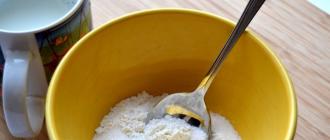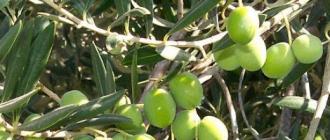IN English adjectives have 3 degrees of comparison: positive, comparative and superlative. The general rules for the formation of each of them can be presented in the form of tables.
Adjective as part of speech
What is an adjective? This is a part of speech that is designed to describe the signs and properties of objects. She answers the questions “Which?”, “Which?” and “Whose?” In English there are two types of adjectives: quality And relative .
Of these, only qualitative ones can have three degrees of comparison: positive, comparative and superlative. Relatives cannot be combined with an adverb very (very) and form degrees of comparison. For example, from relative adjective“wooden” is impossible to form the comparative degree “more wooden”, while from the qualitative “cold” two forms of adjectives can be formed - “colder” and “coldest”.
As can be seen from the examples, degrees of comparison of adjectives in Russian are formed using suffixes or by adding words to the initial form. Let's look at how things are in English using examples.
Positive
The initial form of the adjective is the positive degree: dangerous (dangerous, risky), famous (known), curious (curious). In English, an adjective has no gender, number or case forms. In other words, when forming phrases or sentences, we take an adjective and put it in front of a noun: a dangerous car ( dangerous car), a famous singer (famous singer), curious girls (curious girls).
TOP 4 articleswho are reading along with this
Comparative
The word “comparative” comes from the verb “to compare.” In other words, to a comparative degree we compare the characteristics and properties of two or more objects. In this case, a conjunction may appear in the sentence than (than) or design the...the...(than...,them...), and the adjective itself changes form. There are two ways to form the comparative form:
- TO simple adjective, consisting of one or two syllables, the ending is added -er : fast - faster (fast - faster), weak - weaker (weak - weaker);
- TO compound adjective consisting of three or more syllables, the words are added more (more) or less (less) : aggressive - more aggressive (aggressive - more aggressive), desperate - less desperate (desperate - less desperate).
Excellent
If in a comparative degree we set ourselves the task of comparing two objects, then in a superlative degree we need to single out one “best thing” among the many. To obtain this degree you must do one of two things:
- Add the definite article to a simple adjective consisting of one or two syllables the and ending -est : fast - the fastest (fast - the fastest), weak - the weakest (weak - the weakest);
- To a complex adjective consisting of three or more syllables, add the words the most (most) or the least (least) : aggressive - the most aggressive (aggressive - the most aggressive), desperate - the least desperate (desperate - the least desperate).
General rules
The general rules for the formation of degrees of comparison can be presented in the table “Degrees of comparison in the English language.”
Pay attention to the following examples from the table: hot (hot) and lazy (lazy). In comparative and superlatives in the word hot, the final consonant has been doubled, since the word ends with a vowel and a consonant, and in the word lazy, the final vowel -y has changed to -i.
Exceptions
In English, there are adjectives that are exceptions to the general rule of forming degrees of comparison. These are presented in the following exclusion table:
|
Positive degree |
Comparative degree |
Superlative |
|
good - good |
better - better, best |
the best - the best, (best) best |
|
bad - bad |
worse - worse, worse |
the worst - the worst, (worst) |
|
little - little |
less - less |
the least - the smallest, the smallest |
|
much, many - a lot |
more - more |
the most - the largest |
|
far - distant, distant |
farther/further - more distant/more distant |
the farthest/furthest - the farthest/furthest) |
|
old - old, elder |
older/elder - older/older |
the oldest/eldest - the oldest/oldest |
Pay attention to the meaning of the words farther - the farthest (further - the farthest) and further - the furthest (further - the most distant): in the first case, we mean physical distance, and in the second - strand range. The same can be observed in the words older - the oldest (older - the oldest) and elder - the eldest (older - the oldest). In the first case, this refers to age, and in the second, seniority in the family.
What have we learned?
From this article we learned how Present Simple Tense is formed, in what cases this tense is used, and also how to distinguish Present Simple Tense from other tenses. We learned how to correctly construct a negative sentence in this tense and how to ask a question correctly. We also learned all the adverbs of time, companion words that are characteristic only of Present Simple Tense.
Test on the topic
Article rating
Average rating: 4.7. Total ratings received: 78.
In English it requires special attention and careful study. Adjectives have three forms: positive, comparative and superlative. By analogy with the Russian language, we can give an example:
- big (positive) - more (comparative) - biggest (superior).
In English, three ways are used to form adjective degrees:
- suffixal;
- composite;
- exceptions.
Suffixal way of forming adjectives
The method applies only to one-syllable adjectives and to adjectives consisting of two syllables but ending in -y, -er, -ow. In this case, the comparative degree is formed by adding -er to the end of the word. And superlative - by adding -est and the definite article the before the adjective. For a clear example, let’s create a table with the translation of degrees of comparison of adjectives in English:
| tall (high, incredible) | taller (higher, more incredible) | the tallest (the highest, the most incredible) | Mike is the tallest boy in his class. |
| short | shorter (shorter) | the shortest (the shortest) | It was the shortest weekend in my life. |
Don't forget that when you add a suffix to a word, it may undergo some changes. So, for example, if a word begins with the letter -y, and it is preceded by a consonant, then the letter -y changes to -i.
If a one-syllable adjective ends with a stressed vowel and one consonant, then the last consonant is doubled when forming the comparative degree.
Also look at the table of degrees of comparison of adjectives below.
| hot (hot, hot) | hotter (hotter, hotter) | the hottest (the hottest, the hottest) | It was the hottest day in this year. |

Compound way of forming adjectives
This method of formation is used only for polysyllabic words. To form adjectives we put the word more or the most before the adjective, depending on what degree we need. We will also consider a clear example in the table of degrees of comparison of adjectives in English.
Exceptions in education
This method includes so-called exception words. There are not many of them in the English language, but they have their own characteristics that need to be remembered. Below is a table of exceptions for degrees of comparison of adjectives in English, which you need to know by heart.
| good (good) | better | the best | She is the best student in her class. - She best student in her class |
| bad (bad) | worse | the worst | I got the worst mark in whole class. - I got the worst grade in the whole class |
| little (small) | less | the least | This room in hotel is less preferable for me. - This hotel room is less suitable for me |
| many/much (many) | more | the most | I need more information for doing my job well. - I need more information in order to do my job well |
| old (old) | elder/older | the eldest/the oldest | This car is older than me. - This car is older than me |
| far (far) | further/further | the furthest/the farthest | Let's go further in our discussion. - Let's move further in our discussion |
The last two adjectives require close attention. It is necessary to understand the difference between the older and elder forms. We use the words elder/the eldest only when talking about family ties. In all other cases we use the words older/the oldest.
My brother is elder than my sister. - My brother is older than my sister.
It is the oldest house in our village. - This is the most old house in our village.
The words farther/the farthest are used only in their literal meaning when talking about physical distance. In other cases we use the words further/the furthest.
We are going farther and farther in deep forest. - We go deeper and deeper into the dark forest.
Let's go further in our discussion. - Let's move further in our discussion.

It is necessary to pay attention to the fact that there are adjectives that do not change according to degrees. Such forms are characteristic only of those adjectives that express some degree of a particular attribute, quality or phenomenon. It is worth remembering that this topic is studied at an early stage of language learning, so all tables of degrees of comparison of adjectives in English for children will be as useful as for adults.
Exercises to practice
Fill out the table of degrees of comparison of adjectives in English with translation:
| positive | comparative | excellent | translation |
| different | |||
| hot | |||
| innovative | |||
| musical | |||
| smart | |||
| good | |||
| much | |||
| peaceful | |||
| patient | |||
| fortunate | |||
| happy | |||
| easy | |||
| clever |

Put the adjectives given in brackets into the correct form:
- Do you know our... (far) destination?
- I couldn't solve this task on my math test. It was the ... (difficult) for me.
- History is ... (easy) for me than Art lessons.
- My mum is... (old) than my dad.
Exceptions to degrees of comparison of adjectives in English. The table must be filled out from memory.
| good | ||
| worse | ||
| the most | ||
| elder | ||
| little |
Translate into English:
- My grandfather is the oldest in our family.
- It was the most terrible memory of my life.
- Yesterday I met one of the most beautiful girls on the planet.
- I promised that I would study better.
- My friend is the most kind person in the universe.
(good, yellow, interesting).
Adjectives in English do not change either by gender, or by number, or by case. Adjectives in English can only be modified by degrees of comparison.
Adjectives can be simple or derived. Simple adjectives have neither prefixes nor suffixes. Derived adjectives contain suffixes or prefixes, or both at the same time.
Adjectives form, as in Russian, two degrees of comparison: comparative and superlative. The basic form of the adjective does not express comparison and is called the positive degree.

Adjective
An adjective is a part of speech that is used to denote a characteristic of an object.
- a clever boy
- an English book (English book)
- good butter (good butter)
- a cold winter
An adjective in English has three forms of degrees of comparison:
- positive degree
- comparative degree
- superlative degree.
Adjective degrees
Formation of degrees of comparison of adjectives
The basic form of an adjective is the positive degree. The comparative and superlative forms are usually formed from the positive degree in one of two ways:
The first way to form degrees of comparison of adjectives. If the form of an adjective in the positive degree consists of one syllable, the form of its comparative degree is formed using the suffix -er, and the superlative form - using the suffix -est, which are added to the base of the form of the positive degree.
The second way to form degrees of comparison of adjectives. From adjectives whose positive form consists of three or more syllables, the comparative degree is formed using the word more, and the superlative degree - using the word most, which are placed before the positive form of the adjective.
From two-syllable adjectives, the comparative and superlative forms are also formed using the words more and most.
Sometimes there are forms of two-syllable adjectives, formed using the suffixes -er and -est. Most often these are adjectives whose positive form ends in -у, -er, -ow.
Some adjectives form special forms of degrees of comparison, and these adjectives must be immediately memorized in all forms.
The adjective old forms degrees of comparison in two ways. In most cases, the suffix -er or -est is added to the base of the positive degree form.
However, in cases where they talk about members of the same family - “elder brother”, “eldest of the brothers”, they use the form elder (senior) or eldest (eldest).
To correctly write forms of degrees of comparison of adjectives, you need to know that when adding the suffixes -er and -est, the final letters of the adjective in the form of a positive degree change as follows:
- y changes to i after a consonant and does not change after a vowel: dry dry (dry) - drier - driest But: gay (cheerful) - gayer - gayest
- e is omitted: nice (good) - nicer - nicest
- the consonant is doubled in one-syllable adjectives after a short vowel: big - bigger - biggest
Using an adjective

The adjective is usually used in a sentence as a definition of a noun and stands before the word being defined. An adjective can also be a nominal member of a compound nominal predicate (predicative) and in this case stand after the linking verb to be.
Not a clever boy. He's a smart boy. (Clever - definition.) .Not is clever. He is smart. (Clever is a nominal member of a compound nominal predicate.)
Not all adjectives are used in these two functions. Adjectives alive (alive), afraid (scared), asleep (sleeping), awake (awake), ill (sick) and some others are used only as a nominal member of a compound nominal predicate.
To denote a lower or lowest degree of quality of one item compared to another, the adjective is usually preceded by the word less (fewer, less) or least (least of all).
Additional material.
Degrees of comparison of adjectives and adverbs.
In English, just like in Russian, adjectives and adverbs have three degrees of comparison:
- positive
- comparative
- excellent.
In English there are two ways to construct degrees of comparison.
1. For short (one syllable) words:
Notes:
The definite article is often used with a superlative adjective; When constructing degrees of comparison of adjectives in writing:
- the final consonant with the preceding short vowel is doubled: big (bigger ((the) biggest
- if there is a consonant before the final -y, then -y goes into -i:
easy (easy ((the) easiest; early (earlier ((the) earliest - when adding -er u -est, the final -e is omitted: (see large above). Spelling features do not affect pronunciation.
2. For long (two or more syllables) words:
It doesn't make sense to lengthen the word any further, so in English we add another short word in front:
- beautiful beautiful
- more beautiful
- easily easy
- more easily easier
- most easily
To pass values least and least of all (least) the words less and least are used respectively:
- less beautiful
- least beautiful least beautiful
Note:
Sometimes monosyllabic words form degrees of comparison using more / less or most / least, and conversely, words consisting of more than one syllable have -er / -est at the end; it depends only on the sound - if some form is perceived better by ear than another, it is put into the sentence: crisp - more crisp - (the) most crisp sounds better than crisp - crisper (the) crispest.
The forms of degrees of comparison of some adjectives and adverbs in English are not formed according to the rule:
Note: The word little can be either an adjective or an adverb; in this case it is used only as an adverb little; if you need to construct degrees of comparison from the adjective small, we use the word small (see above).
Note: the forms elder / eldest are used more often when the speaker is talking about members of his family:
- My father is older than my mother. My father is older than my mother.
- This is my eldest son. This is my eldest son.
In most other cases, degrees of comparison of adjectives are formed using method 1:
old old er old est
.The word most with indefinite article(a most) is not a degree of comparison, but means very: a most beautiful girl is a very beautiful girl.
The word most can come before a noun or pronoun in plural(often with the preposition of) and has the meaning many/most:
Most people like this. Many people like it. Most of them will not be able to come. Most of them won't be able to come.The definite article is preserved before the superlative form even if there is no noun: Not is the best. He's the best.
To denote the comparative degree of an adjective, the word than is used; however, in order to avoid repetition of the same noun, the word one is often used as a substitute for this noun or a possessive pronoun in absolute form:
- My car is bigger than their one / theirs. My car is bigger than theirs.
- These cigars are stronger than those ones. These cigars are stronger than those.
In the second part of comparative constructions, you can use pronouns both in the objective case (colloquial version) and accusative case(literary version, usually with an auxiliary verb):
- She reads more than him / he does. She reads more than him.
- You are taller than me / I am. You are taller than me.
- Didn't come earlier than them / they did. He arrived earlier than them but
- I know him better than her. I know him better than her.
- I know him better than she does. I know him better than she does.
When comparing the same quality, the combination as ... as (same (same) ... as (s) / as (same) ... as (s) is used: She is as beautiful as my mother(She is as beautiful as my mother.
When comparing quality in a negative form, the combination not so ... as is more often used (not such ... as: I am not so beautiful as her / she is.(I'm not as beautiful as her.
When comparing with a multiple effect, the combination as ... as with numerals is used; the second as may be omitted if another comparison object is not mentioned in the situation:
- My sister is twice as beautiful (as yours).(My sister is twice as beautiful (as yours).
- His car is about three times as big (as my car).(His car is three times larger (mine).
The word half in such cases means half as much:
This liquid is half as strong (as that one).(This liquid is twice as weak (that one). I have half as much money (as you have).(I have half as much money (than you).Sometimes a comparison can be strengthened with the help of additional words; most often, much is used for this: much more/ less beautiful much more / less beautiful;
The Russian version of what..., the... is translated into English language the+ comparative degree of adjective... the + comparative degree of adjective:
- The faster you come the more you will get. The faster you arrive, the more you will get.
- The sooner you do it the better. The sooner you do this, the better.
English adjectives are not difficult to learn, since they have one single word form that fits nouns of all genders and numbers. This form changes only in one case - when using an adjective in the comparative or superlative degree. In this case, either a suffix or a special additional word is added to the base. But, as is often the case in English, not all words behave according to the general norm. So today we will study grammar rules and all exceptions in the degree of comparison of adjectives in English.
In English grammar, there are three degrees of an adjective:
- positive ) – original form words describing signs and qualities ( friendly);
- comparative ) – describes the characteristics of an object/hero in comparison with another object ( more/less friendly);
- superlative ) – indicates absolute perfection and unsurpassed characteristics ( the friendliest).
As already noted, changes in the stem of a word occur only in the comparative and superlative degrees. These comparative forms are obtained in two ways: by adding suffixes or by using additional words.
Synthetic forms of adjectives
This form is typical for all one-syllable and some two-syllable adjectives (with endings – y, -er, -ow, -le, -some). When forming the comparative degree, the suffix – er is added to the stem of such words, and when constructing the superlative degree, the suffix – est is added.
* It is worth noting that in a sentence the superlative degree is used with the definite article: Iam the happiestpersonintheworld- I am the most happy man on earth!
It is noteworthy that the synthetic form is characteristic of a number of special two-syllable adjectives. These are the words: clever, common, friendly, simple, pleasant, handsome, polite, angry, quiet, gentle, cruel, narrow. They form degrees of comparison both by the suffixal method and by the analytical method, which we will discuss in the next section.
Analytical forms of adjectives
Polysyllabic adjectives can only be formed using special words: more (comparative) and most (superlative).
At the same time, analytical adjectives in the superlative degree are also written with the article the: Thebusis the mostconvenientmeansoftransport– The bus is the most convenient means of transport.
At first glance, everything in degree education is simple, clear and logical. But the English language would not be English if it did not make exceptions to the rules for some words.
Exceptions to the degree of comparison of adjectives in English
In this section we will consider all the special cases of forming the degree of comparison of adjectives in English.
Special degrees of comparison
At the beginning of the article, we noted that the base of an adjective never changes. But in exceptional cases one has to face such a phenomenon as the formation of comparative forms of adjectives from completely different roots. This method of changing the form of a word is called suppletive. There are very few adjectives with such an original method of forming comparative degrees, but they are among the most common English words. Therefore, the table below must be memorized.
*adjectives have the same meaning, but are used for different classes of words ( much– uncountable nouns, many– countable nouns.).
To quickly and easily remember these exceptional cases, let's work with examples of their use in sentences.
- It was a bad idea. My car is worse than yours. It was the worst day of the whole vacation.
This was a bad idea. My car is worse than yours. It was the worst day of the entire holiday.
- She has a good house. Her house is better than mine. It is the best house in the whole city.
She has a good home. Her house is better than mine. This is the most best house all over the city.
- I have much free time. I have more free time in winter than in summer. Most of my free time is spent on studying English.
I have a lot of free time. I have more free time in winter than in summer. Most of my free time is spent learning English.
- We make a little progress in English. But our progress is less, than your friend's progress. And Bob had made the least progress in his group.
We have made some progress in English. But our progress is less than your friend's progress. And Bob was the least successful in his group.
Double degrees of comparison
Another interesting case is represented by adjectives that have two options for degrees of comparison and both different meaning. In English grammar there are 4 polysemous words, changes in forms and meanings of which should be learned by heart.
| Positive degree | Comparative degree | Superlative |
| old | older older (grow up) |
oldest oldest (adult) |
| elder eldest (related) |
eldest the oldest (by position) |
|
| late | later later |
latest latest (most recent, new, e.g. |
Degrees of comparison are a grammatical phenomenon characteristic of qualitative adjectives, that is, those that express certain qualities of a particular subject. The meaning of such degrees is to express this quality to a greater or lesser extent. There are three degrees of comparison of adjectives in English - positive, comparative and superlative. The positive degree is a qualitative adjective in its initial form (cold). The comparative degree is the one in which this quality is already expressed to a greater degree (colder), and the superlative degree is when the quality is expressed in its highest degree (coldest, coldest).
Cold – colder- the coldest - Cold – colder (than) – the coldest
Smart-smarter-the smartest - Smart - smarter - smartest
As you noticed, superlative comparative adjectives acquire a “companion” - the article the.
The hottest news of the week - The hottest news of the week (meaning the hottest of all news)
The scariest movie I’ve ever seen - The scariest movie I’ve seen (among the others I’ve watched)
The only exception is cases where a very high degree of quality is intended, but there is no comparison with another item
Sunrises are most beautiful there -There are unusually beautiful sunrises
Ways to form degrees of comparison of adjectives in English
English grammar distinguishes three ways of forming comparative degrees: synthetic (using suffixes), analytical (with words of comparison more-most, less-least) and suppletive (for special occasions, such as good-better-the best). The ways in which degrees of comparison of adjectives are formed in English depend on the structure of the adjective.
Synthetic method used when the adjective contains one syllable, or two, with the emphasis on the last syllable.
Thin-thinner-the thinnest - Thin - thinner - the thinnest
Rude – ruder – the rudest - Rough – ruder (than) – the rudest
The same method applies to two-syllable words, with -ble, -er, -y, -some, -ow at the end
noble – nobler – noblest
tender – tenderer – tenderest
happy – happier – happiest
narrow – narrower – narrowest
But in order to correctly form the comparative degree, it is not enough to simply “stick” a suffix at the end. There are a number of rules that must be followed.
The silent - e is omitted at the end of adjectives; don’t even think about doubling it.
Strange-stranger-the strangest - strange - stranger - the strangest
If an adjective ends with a short vowel and consonant, the final consonant is doubled to form the comparative and superlative degrees.
Hot-hotter-the hottest
Instead of the letter y, if the adjective ends in it, the suffix must be preceded by the letter i
Crazy-crazier-the craziest
Lazy-lazier-the laziest
Polysyllabic words form their comparative forms using the auxiliary words more\less, for example
effective – more effective – the most effective
dangerous – more dangerous – the most dangerous
Let us remind you that if we are not talking about comparison, but only about a high degree of quality, we do not use the article the, and the word itself takes on the meaning “extremely” or “very”.
The suppletive method includes those examples that are exceptions to general rules. There are few such words, but enough to put them in a separate category. For example:
good – better – best
bad – worse – worst
little – less – least
many – more – most
far – farther/further – farthest/furthest
old – older/elder – oldest/eldest
Moreover, when we say farther, we mean geographical distance
I live farther from zoo than Mary - I live further from the zoo than Mary
Further is used in a broader sense - “further information”, “on other issues”, etc.
You can find further information on our website.
Elder (elder) is used when talking about seniority in a family or social group (elder sister, older brother), in most cases older is used as an indicator of age.
Compound adjectives in English
Compound adjectives in English form their degrees of comparison using the words more-most, or by changing the first element if the word consists of two parts separated by a hyphen. Especially when at the beginning of the word there is good- bad- well- and other adjectives for which there is their own form of formation.
well-known – better-known – best-known
good-looking – better-looking – best-looking






